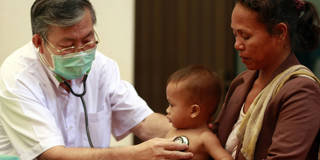To improve health outcomes in developing countries in a meaningful way, pharmaceutical companies must do more than merely provide medicine at reduced prices. Strengthening local capabilities by working with communities and startups and nurturing innovation ecosystems will be critical to mitigating future threats.
PARIS – While the end of the COVID-19 pandemic may be “in sight,” as the World Health Organization recently declared, the world faces numerous emerging health risks. Some are exacerbated by climate change, others by travel, online misinformation, food scarcity, poverty, or wars. Fortunately, the pandemic has taught us valuable lessons for managing these risks – and for helping vulnerable developing economies better prepare for future health crises.
The WHO’s Access to COVID-19 Tools (ACT-A) Accelerator has been a massive global effort that facilitated testing, treatment, and vaccination worldwide. But it is clear that ACT-A failed to address the longstanding structural obstacles that impeded vaccination rollouts in low- and middle-income countries. Doing so requires a new framework that emphasizes local relationships with workers and entrepreneurs on the ground.
Developing countries have fewer health workers per capita than developed countries do. Africa, Southeast Asia, the eastern Mediterranean, and parts of Latin America face a shortfall of 5.9 million nurses and 18 million health-care workers by 2030. In 2019, 13.8 million infants worldwide did not benefit from routine immunization services, including 8.8 million from lower-income countries. It is hardly surprising, then, that only 16% of people in low-income countries have received at least one COVID-19 vaccine dose as of May, even though global supply now far outstrips demand.

PARIS – While the end of the COVID-19 pandemic may be “in sight,” as the World Health Organization recently declared, the world faces numerous emerging health risks. Some are exacerbated by climate change, others by travel, online misinformation, food scarcity, poverty, or wars. Fortunately, the pandemic has taught us valuable lessons for managing these risks – and for helping vulnerable developing economies better prepare for future health crises.
The WHO’s Access to COVID-19 Tools (ACT-A) Accelerator has been a massive global effort that facilitated testing, treatment, and vaccination worldwide. But it is clear that ACT-A failed to address the longstanding structural obstacles that impeded vaccination rollouts in low- and middle-income countries. Doing so requires a new framework that emphasizes local relationships with workers and entrepreneurs on the ground.
Developing countries have fewer health workers per capita than developed countries do. Africa, Southeast Asia, the eastern Mediterranean, and parts of Latin America face a shortfall of 5.9 million nurses and 18 million health-care workers by 2030. In 2019, 13.8 million infants worldwide did not benefit from routine immunization services, including 8.8 million from lower-income countries. It is hardly surprising, then, that only 16% of people in low-income countries have received at least one COVID-19 vaccine dose as of May, even though global supply now far outstrips demand.